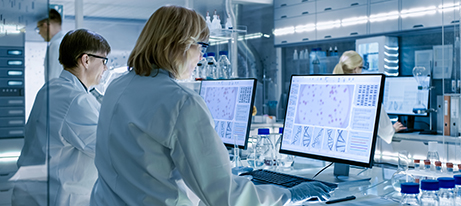
Getty Images / gorodenkoff
Two scientific sessions at the 2020 AACC Annual Scientific Meeting & Clinical Lab Expo explore the transformative role of data in healthcare and how clinical laboratory professionals can make data expertise part of their practice. Data is becoming a routine part of quality assurance and is being aggregated into new information, according to Christopher McCudden, PhD, one of the presenters of How Clinical Laboratory Data Is Impacting the Future of Healthcare (34104).
“In particular, there are growing initiatives to use artificial intelligence to generate predictions from data. This is analogous to having a whole new series of diagnostic test information. The applications are vast; from specific disease diagnoses to patient prognosis to acute decompensation, algorithms are becoming integrated into healthcare,” said McCudden, an associate professor in the Department of Pathology and Laboratory Medicine at the University of Ottawa and clinical biochemist with The Ottawa Hospital’s Division of Biochemistry.
This session takes place December 16 from 11 a.m.–12:30 p.m. Central Time and is worth 1.5 ACCENT credits. Jonathan Chen, MD, PhD, assistant professor of medicine at The Stanford University Medical Center, joins McCudden on the panel of this session.
Chen plans to demystify buzzwords such as AI and machine learning, and help participants recognize credible versus implausible applications, relating them to established risk assessment and diagnostic tools. His presentation will provide a high-level overview of common machine learning techniques that have largely taken over the marketing buzzword of AI, explaining their potential use in medical applications such as risk scores and diagnostic laboratory tests.
He’ll also provide examples of project applications of data-driven systems to illustrate which lab tests a clinician should order for individual patients, which tests are too low-yield to check, and implementation challenges affecting practice behavior around such testing.
Data is transforming healthcare on several fronts, Chen told CLN Stat. “When medicine had relatively few effective interventions for patient care, it was possible for an individual clinician to know it all and do it all,” he observed. “Experiential learning, heuristics, and pattern recognition became the norm, but collides with the current reality of an explosive growth in biomedical knowledge. With thousands of diagnostic tests, pharmaceutical drugs, and recognized disease states, we routinely face a combinatorial explosion of possible medical decisions.”
Partnering human experts with data-driven computational tools capable of synthesizing information overload into effective healthcare is the only credible approach for managing the escalating complexity of modern medicine, Chen continued.
McCudden will provide recent examples of AI related to lab medicine, how to consume algorithms as laboratorians, challenges around AI implementation, and the benefits of engaging in AI (and risks of not engaging) as lab professionals.
Lab professionals are the source of most information in the health record. They’re also subject matter experts who can describe all of the limitations and details about a given lab result, McCudden said. This includes a deep understanding about the results from different instruments and about standardization, imprecision, biological variation, test matrices (for example, serum versus plasma), reference intervals, analytical interferences, and preanalytical errors.
Through this session, participants will be able to:
- Identify opportunities for incorporating data analytics into current laboratory practice.
- Explain how laboratory data is being used by healthcare practitioners and decision-makers.
- Take part in interdisciplinary teams using laboratory data to build healthcare algorithms.
- Explain how laboratory data may affect the future of healthcare and how to become a key participant in those discussions.
Take another dive into data by attending Informatics and the Clinical Chemist: Exploring the Role and Scope for Training and Careers (32105). This session occurs on December 14 from 11 a.m.–12:30 p.m. Central Time and is worth 1.5 ACCENT credit hours.
Ronald Jackups, MD, PhD, an associate professor of pathology, immunology, and pediatrics at Washington University School of Medicine in St. Louis, will define clinical informatics and discuss how the field provides insight and a pathway toward meaningful quality improvement within the clinical laboratory.
S. Wesley Long, MD, PhD, associate professor of pathology and genomic medicine at Houston Methodist, plans to illustrate some of the different analytics projects that present opportunities for informatics-aware clinical laboratory professionals.
Data analytics “can be critical to everything from maintaining good quality control, understanding workflow in the laboratory, evaluating different tests, and even determining appropriate staffing and batch sizes,” said Long.
Training and knowledge in this field is a must-have for clinical laboratory professionals. “While it’s not necessary to learn how to build the tools themselves (for example, databases, dashboards), it’s essential to be able to work with information analysts to design the tools to ask the right questions,” Jackups told CLN Stat. Many opportunities exist for clinical chemists to develop and practice skills in analytics, added Long. This is true for all sections of the clinical laboratory. “Chemistry in particular has a wealth of data to work with and ample opportunities to visualize that data.”
Clinical chemists and pathologists can help bridge the gap between the desires of their hospital/medical leadership and the information patient data systems capture and display, to drive quality and healthcare improvement, said Jackups.
Healthcare systems have been focusing on encouraging appropriate use (and discouraging inappropriate use) of lab testing, Jackups continued. “That process starts with understanding the state of test utilization in your hospital. Investigating each order, one-by-one, of a high-throughput test is not feasible. Data analytics can help labs identify specific tests or specific ordering services at most need for targeted utilization intervention.” In his view, data analytics are easier to perform with tests that have discrete results (for example, quantitative values or positive/negative results). This is true for most high-throughput tests in clinical chemistry.
Informatics is not just “science with computers,” Jackups emphasized. It’s a discipline “that allows us to leverage information and communication technology to improve healthcare and make laboratory experts an integral and visible part of that process.”